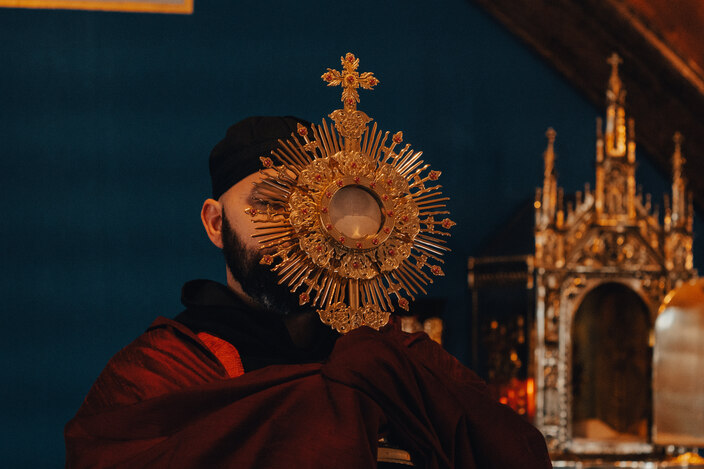St. Michael’s Chaldean Catholic Church
Eucharist

The Eucharist is the Body, Blood, Soul and Divinity of our Lord Jesus Christ. This is the great Gift that Jesus gives to his church while she is on pilgrimage on earth, journeying toward her Bridegroom in heaven. He gives her himself fully in this great sacrament to unite himself to every member of the church and them to himself, until we reach that full unity in heaven. It is a foretaste of heaven, insofar as we already receive now, in the Eucharist, what we will have in heaven.
In the Chaldean Church, we call this sacrament the Qurbana, translated as Offering (as in sacrificial offering). Whereas in the Latin and Greek churches, the Eucharist is the sacrament of thanksgiving (which is what the word translates as), among other things, the Church of the East highlights the sacrificial aspect of it. This is Jesus’ offering of himself to the Father on the Cross for man’s salvation; it is this offering that we celebrate and present again to God, that we participate in ourselves by offering ourselves with him, and that brings us into Jesus’ own love of the Father, making us sons and daughters of God in the Son.
The sacrament of the Eucharist, also known as Holy Communion, stands as the cornerstone of Catholic worship and faith. Rooted in the Last Supper of Jesus Christ, this sacrament holds profound significance as a spiritual nourishment, a symbol of unity, and a testament to the enduring presence of Christ in the lives of believers.
Mystical Union with Christ:
The Eucharist is a sacramental encounter with the living presence of Christ. Catholics believe that during Mass, the bread and wine become the actual Body and Blood of Christ through the process of transubstantiation. This mystical transformation allows believers to commune intimately with Christ, fostering a deep spiritual connection and unity.
Nourishment for the Soul:
The Eucharist provides spiritual nourishment, akin to food for the soul. By receiving the consecrated elements, Catholics are spiritually fed, fortified, and sustained in their faith journey. This nourishment empowers believers to navigate life’s challenges with renewed strength and conviction.
Source and Summit of Catholic Life:
The Eucharist is often referred to as the “source and summit” of Catholic life. It is the wellspring from which all grace flows and the pinnacle of communal worship. Participation in the Eucharistic celebration enhances believers’ understanding of their faith, deepening their connection with Christ and the Church.
Unity and Community:
Through the Eucharist, believers experience a profound sense of unity with fellow worshipers and the larger global Catholic community. Sharing in the same Body and Blood of Christ reinforces the bond of faith and fellowship, emphasizing the inter connectedness of believers regardless of cultural or geographical differences.
Sacrificial Offering and Thanksgiving:
The Eucharist also serves as a sacrificial offering and an act of thanksgiving. It commemorates Christ’s sacrifice on the cross, making present His self-giving love and redeeming grace. In receiving the Eucharist, believers express gratitude for God’s boundless love and salvation.
Ongoing Conversion and Transformation:
Partaking in the Eucharist invites believers into ongoing conversion and transformation. The act of receiving Christ’s Body and Blood calls for a commitment to live according to His teachings, fostering a life of virtue, love, and service to others.
Conclusion:
The sacrament of the Eucharist holds a central place in the life of the Catholic Church, embodying the profound mystery of Christ’s presence and the transformative power of His love. As believers partake in Holy Communion, they are nourished, united, and transformed, embracing their role as part of the larger Body of Christ and finding sustenance for their spiritual journey. The Eucharist serves as a tangible expression of faith, a reminder of Christ’s sacrifice, and a source of grace that continues to inspire and guide Catholics in their quest for holiness and communion with God.
